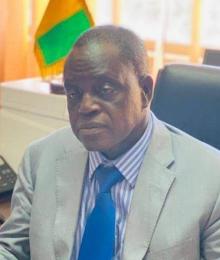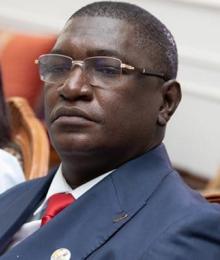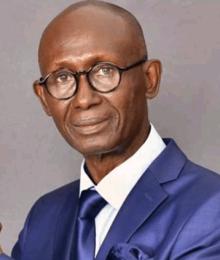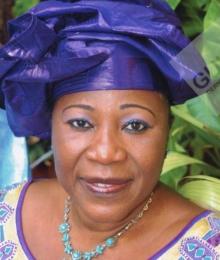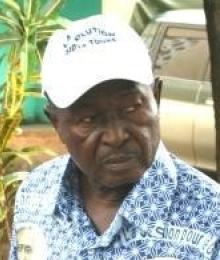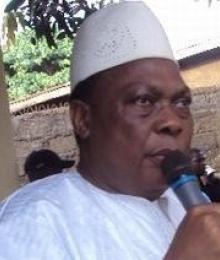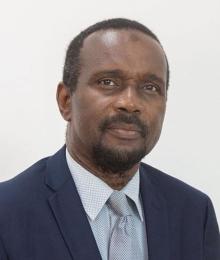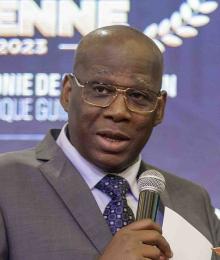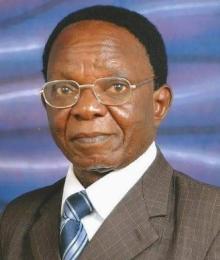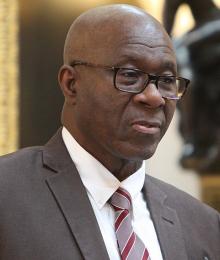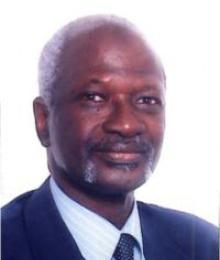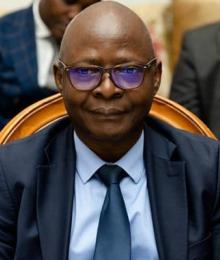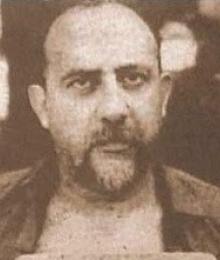
Jean-Paul Alata (1924-1978) was a French administrator and accountant who became a Guinean citizen, embodying the paradoxes of African decolonization. Born in Brazzaville and educated in law in Paris, he actively supported Guinea's independence and became a close collaborator of President Ahmed Sékou Touré, holding several key economic positions in the newly independent state. His fight against corruption earned him many enemies within the regime.
His fate took a dramatic turn in 1971 when he was arrested and imprisoned for over four years in the infamous Camp Boiro, accused of participating in a conspiracy against the state. Released in 1975 thanks to French diplomatic intervention, he recounted his experience in Prison d'Afrique, a book initially censored in France to preserve diplomatic relations with Guinea. Exiled in Côte d'Ivoire, he died there in 1978, leaving behind the testimony of a man who, after believing in Guinea's revolutionary ideals, became one of its many victims.
Introduction
Jean-Paul Alata, an emblematic figure of Franco-Guinean history, had a life as fascinating as it was tragic. From his political engagement in Africa to his detention in the infamous Camp Boiro, his story reflects the complex relations between France and its former colonies during a pivotal period in African history.
Origins and Education
Born on August 17, 1924, in Brazzaville, Jean-Paul Alata was the son of a French colonial army officer. His childhood was marked by numerous relocations between Congo, Lebanon, and Syria, following his father's postings. After his father's death, he was raised by his stepmother at the "Ferme Alata" near Brazzaville. This family property was more than a mere livestock farm; it also housed a reception hall and, intriguingly, a cabinet of curiosities containing human and animal fetuses.
His intellectual path led him to Paris, where he studied law. During this period, he joined the French Resistance, already displaying the committed spirit that would characterize him throughout his life. Initially drawn to a military career, he considered joining the École militaire interarmes before changing direction. Ultimately, he joined the Overseas Treasuries in Saint-Louis, Senegal — the first step of a professional journey that would deeply connect him to Africa.
Political Engagement and Rise in Guinea
In Senegal, Alata quickly developed a sharp political awareness. He successively joined several organizations: the Rassemblement du Peuple Français (RPF), the French Section of the Workers' International (SFIO), and Force Ouvrière (FO). These varied engagements reflected his evolving ideological search, which gradually led him toward anti-colonialism.
In May 1955, after ten years in Senegal, his career took a decisive turn when he was transferred to Guinea as the chief treasurer. It was here that he drew closer to Ahmed Sékou Touré, a rising figure in Guinean nationalism and unionism, whom he had met a few years earlier. Their collaboration intensified within the African section of the Confédération Générale du Travail d'Afrique (CGTA).
His political activism led to threats of dismissal from public service, prompting him to resign and become an independent accountant. Simultaneously, he founded the "Société des Pêcheries Guinéennes," demonstrating his economic commitment to the country.
When Guinea gained independence in 1958, Alata stood out as one of the few Europeans actively supporting the cause. His political stance, contrary to that of most French expatriates, showcased his deep belief in the right of people to self-determination.
The Statesman and Dual Nationality
In 1960, responding to an invitation from his friend Sékou Touré, now the president of the Republic of Guinea, Alata sold his fishing business to serve the new state. He held several strategic economic positions: first as an inspector of administrative and financial affairs at the presidency and later, after 1963, in various ministerial roles. He also shared his expertise by teaching accounting and political economy at the Gamal Abdel Nasser Polytechnic Institute in Conakry.
His dedication to his adopted homeland was formalized on August 23, 1960, when a decree granted him Guinean nationality. However, this new citizenship soon led to a rupture with his country of origin. On June 19, 1962, France stripped him of his French nationality due to his positions deemed hostile, including his proposal to support the National Liberation Front (FLN) during the Algerian War.
In his economic roles, Alata earned a reputation for his unwavering stance against corruption. Despite aligning with the regime's proclaimed principles, this crusade garnered him many enemies within the state apparatus.
His personal life also underwent significant changes in Guinea. On November 6, 1969, he married Ténin Kanté, a sports teacher, according to local customs, although their marriage was never legally recognized.
During the "Operation Green Sea" on November 22, 1970 — an attempted invasion of Guinea by Portuguese forces — Alata demonstrated his loyalty by fighting alongside Guinean forces against the invaders from Portuguese Guinea.
The Ordeal of Camp Boiro
Alata's fate dramatically changed on January 11, 1971, when he was arrested, accused of involvement in a supposed conspiracy involving the French Secret Service (SDECE), the American CIA, and a mysterious network named "SS-Nazi" linked to Operation Green Sea. Just a few months later, on January 25, 1971, he learned of his life sentence and the loss of his Guinean nationality, rendering him stateless.
While detained in the notorious Camp Boiro, Alata endured severe torture, including electric shocks, as well as constant humiliation. Like other political prisoners, he was regularly interrogated by an investigative commission under the threat of further torture or reprisals against his family. This pressure forced him to denounce others and sign lists of "traitors" prepared by the commission.
Ironically, his skills were exploited by the regime, which compelled him to assist the very commission responsible for his persecution by rephrasing certain confessions. This paradox highlighted Sékou Touré's cunning ability to manipulate the ideological loyalty of his victims, even under inhumane conditions.
In a brief moment of light during this dark period, on August 7, 1971, Alata's wife, Ténin, gave birth to their son, whom President Touré, in a gesture both paradoxical and symbolic, named Ahmed Sékou Alata.
Release, Exile, and Final Struggles
After fifty-two months of detention, Jean-Paul Alata was finally released on July 14, 1975, following the intervention of André Lewin, the French ambassador to Guinea. His return to France proved challenging; during the flight to Paris, he narrowly escaped an assault from former co-detainees who resented his past association with the Guinean regime.
His imprisonment had left lasting physical damage: he lost 35 kg (dropping from 96 kg to 61 kg), ten teeth, and suffered partial paralysis. Despite this, Alata sought to share his experience through writing.
In Paris, he began writing "Prison d'Afrique," a firsthand account of his time at Camp Boiro. However, the French authorities banned the book on October 21, 1976, citing legal provisions restricting foreign publications, given Alata's stateless status.
Despite this censorship, excerpts appeared in the magazine Africa, and the book was translated into Portuguese and English, ensuring its international reach. To make a living, Alata contributed to several publications focused on African issues.
His testimony angered Sékou Touré, who demanded Alata's extradition and wrote to French President Valéry Giscard d'Estaing in June 1977. France's response affirmed that Alata had left the country and would be expelled if he attempted to return.
Forced into further exile, Jean-Paul Alata settled in Treichville, Ivory Coast, where he died in early September 1978, officially from a heart attack. However, some opponents of the Guinean regime speculated that he was poisoned at Sékou Touré's behest.
It was only on July 9, 1982 — four years after his death and nearly two years after Touré's passing — that "Prison d'Afrique" was finally allowed in France, giving Alata's testimony the audience it deserved.
Legacy and Impact
Jean-Paul Alata remains a complex figure of Franco-African history, symbolizing the contradictions and tragedies of decolonization. Initially an ardent supporter of Guinea's independence and a dedicated collaborator of Sékou Touré, he later became a victim of the very regime he had helped establish. His journey illustrates the authoritarian excesses of many post-colonial African states and the ambiguous ties between France and its former colonies.











